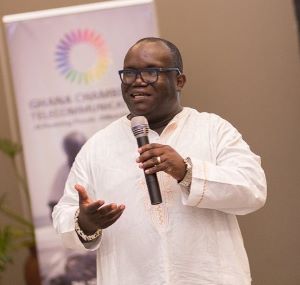Findings from a Total Tax Contribution (TTC) survey by the Ghana Chamber of Telecommunications has brought to light the significant contribution of the telecommunication sector towards Ghana’s socioeconomic development.
According to the data, the sector’s total taxes and payments to government amounted to over GH¢3.2 billion in 2019.
This figure represents approximately 9.5 percent of Ghana’s annual total tax revenue earnings.
The Chamber used a TTC methodology to measure total cash payments for business operations by its members over the period.
The tax components included Corporate Income Tax, Value Added Taxes, Communication Service Tax, Withholding taxes and others.
Key highlights from the study shows Communication Service Tax (CST) was GH¢414 million, Value Added Tax (VAT) was GH¢480 million, Corporate Income Tax (CIT) stood at GH¢832 million, Withholding Tax (WHT) was GH¢415 million, Import Duties stood at GH¢210 million and National Fiscal Stabilization Levy (NFSL) cost the members GH¢71 million.
The Surcharge on International Incoming Traffic (SIIT), which is the quantum of six cents per every minute of call that comes from overseas into the country, also amounted to GH¢107 million in 2019.
The Pay-As-You-Earn (PAYE) tax stood at GH¢96 million and finally the National Fiscal Stabilisation Levy (NFSL), stood at GH¢71 million.
The study further showed that the mobile industry widely provides 6,700 direct jobs and over 1.8 million indirect jobs, contributing 2.93% to (Non-oil) GDP, and invested GH¢1.55 billion in capital expenditure within the fiscal year 2019.
At a media engagement held in Accra on Tuesday, November 24, 2020, Chief Executive Officer of the Telecoms Chamber, Ken Ashigbey, after giving a breakdown of the taxes noted that in spite of the heavy tax burden, the telecommunication industry continues to commit investible funds into capital expenditure to meet customer service quality and experience needs.
“CAPEX investment has increased exponentially in the fiscal year. However, there is the need for policy to support and enable even more investment by all players into the ecosystem to meet customer demand for mobile services,” he said.
“The mobile industry believes that policy enablers such as tax reforms, tax rebates in relation to import of infrastructure and equipment’s could improve the affordability of mobile technology and services for customers yielding greater strides for all stakeholders in the long-term.”
Data from the study showed the industry wields over 41 million active voice SIMs, 28 million active data subscribers, 14.5 million active mobile money customers and over 300,000 active merchants and agents.
The study further noted that “appropriate spectrum management framework [by the industry regulator] will provide needed clarity for more funding into existing and new technologies such as 4G and 5G, which requires further policy direction and support to grow.”
Dr. Kenneth Ashigbey, finally concluded that, “Mobile is the most cost-effective way of extending access to ICT, the internet in Ghana as well as driving the digitization agenda we pursue. It is therefore fundamental to helping our government achieve its objectives of expanding the ICT infrastructure, meeting last mile goals, connecting the unconnected and positioning our economy as a smart and digital-ready market towards further growth.”
Source: Citibusinessnews.com







